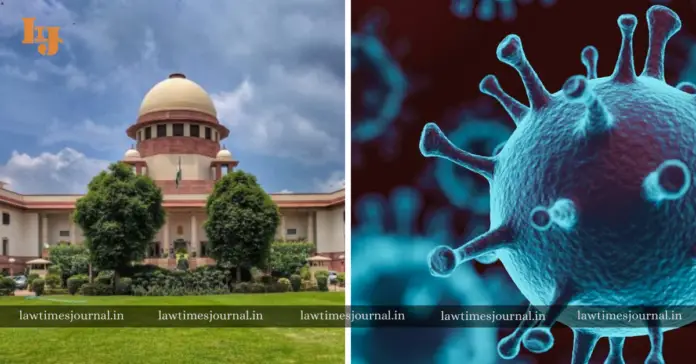
The Supreme Court Monday passed a slew of directions for all courts across the country to extensively use video-conferencing for judicial proceedings saying congregation of lawyers and litigants must be suspended to maintain social distancing amid coronavirus pandemic.
Prior Facts:
The top court has taken suo motu (on its own) cognizance of a letter written by senior advocate and former Supreme Court Bar Association (SCBA) president Vikas Singh, who has suggested measures for use of technology for conducting hearings in the courts.
Last week, Justice Chandrachud, who is also the chairperson of the Supreme Court E-committee, had on April 3 held a meeting through video conferencing with high court judges heading such committees to ensure urgent matters are heard promptly and litigants are not required to come to court during the lockdown period.
Key Features:
- The top court, which has restricted its functioning and is conducting hearing through video conferencing of extremely urgent matters during the lockdown period since March 25, exercised its plenary power under Article 142 of the Constitution to direct all the high courts to frame a mechanism for use of technology during the pandemic.
- Stressing that “technology is here to stay“, a bench headed by Chief Justice S A Bobde said that recent outbreak of COVID-19 has necessitated social distancing and it is necessary to ensure that court premises do not contribute to the spread of coronavirus.
- The bench, also comprising Justices D Y Chandrachud and L Nageswara Rao, directed that all courts would maintain helpline for grievances regarding video feed during and immediately after the hearing and they must make appropriate arrangements for litigants, who do not have access to such facilities.
- The apex court made it clear that no evidence would be recorded via video-conferencing and if a recording of evidence is must in the courts, then the concerned judge would ensure that distance is maintained inside the courtroom.
- It said courts will have the power for restricted entry for the proceedings and to adjourn the hearing if the crowd cannot be managed.
- The bench said that no presiding officer would restrict the entry of parties to the case unless they are having any health problem.
- It clarified that these directions have been issued to ensure that the judiciary rises to face this unique challenge of COVID-19 pandemic and these directives would remain in place till further orders.
- The bench said that to ensure the continuous functioning of courts, every stakeholder is expected to coordinate during this “unprecedented and extraordinary” outbreak of COVID-19.
- There is a need to follow social distancing guidelines while maintaining constitutional role, the bench said, adding that “all hearing in the congregation must necessarily be suspended“.
- It observed that technology has facilitated accessibility and connectivity and Indian courts have been proactive in harnessing technology.
- Attorney General KK Venugopal told the bench that the issue which arises is as to whether we are having the most efficient system which can be accessed by lawyers across the country.
- Venugopal said NIC must look into the aspect as to which is the most efficient and cheap application that could be used by all lawyers across the country.
- Solicitor General Tushar Mehta told the bench that this is the best solution under these circumstances and though it might not be a suitable model for long drawn hearing, it would be a solution for short hearings.
- The Director-General of NIC, who was present for the hearing, told the bench that three things are required for video-conferencing — good broadband connection, good devices, and conduct of people, where if one person is speaking then others must put the device on mute.
Judgement:
- The bench while issuing the guidelines said it is “not a matter of discretion but a duty” to ensure that court premises do not contribute to the spread of viruses and courts must take all measures to ensure guidelines on social distancing and public health are followed.
- The top court asked the department of justice and National Informatics Centre (NIC) to take note of the problems which the apex court had faced on April 3, when there was connectivity issue during court hearing through video-conferencing.
- The apex court, which adjourned the matter for four weeks, asked its secretary-general, registrar general of all the high courts and DG of NIC to coordinate on this issue and observed, “This cannot be seen as a temporary issue. Technology is here to stay”.
Edited by J. Madonna Jephi
Approved & Published – Sakshi Raje





